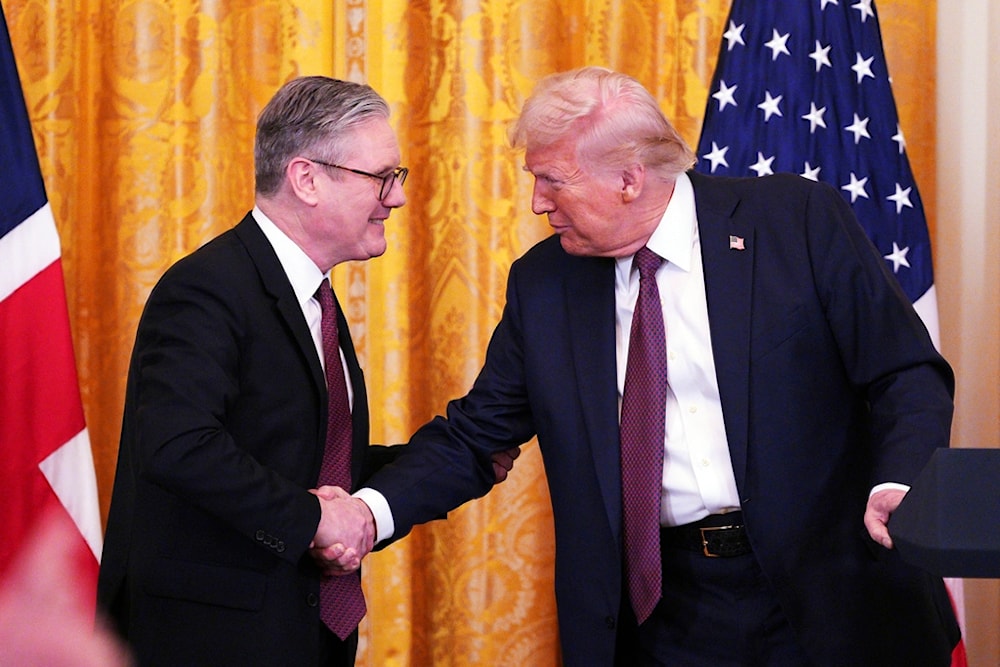Starmer's government accused of 'surrender' to Trump amid US tax cuts
The Labour government has been warned against appeasing Trump and Musk through potential US tech tax cuts while cutting disability benefits.
-

Britain's Prime Minister Keir Starmer, left, and US President Donald Trump shake hands at a joint press conference in the East Room at the White House Thursday, February 27, 2025, in Washington. (AP)
Labour leader Keir Starmer is facing criticism over potential plans to reduce the UK’s digital services tax on US tech giants while implementing welfare and public sector cuts, raising concerns about appeasing US President Donald Trump, The Guardian reported.
Chancellor Rachel Reeves confirmed ongoing discussions about the £1bn-a-year tax affecting companies like Meta and Amazon, though any changes would not be included in this week’s spring statement. She expressed optimism that Trump’s 25% tariffs on British steel could be lifted but did not rule out modifications to the tax. “You’ve got to get the balance right,” she said.
The Liberal Democrats warned that Labour risked “losing its moral compass,” arguing that scrapping the tax while cutting disability benefits would be like “robbing disabled people to appease [Elon] Musk and Trump.”
Labour MPs are also on edge over £5 billion in welfare reductions and Whitehall job cuts, with former shadow cabinet minister Rachael Maskell cautioning against “letting US tech companies off the hook while making disabled people pay for the revenue loss.”
MP Clive Lewis accused the government of an “abject surrender” to Trump’s influence, calling the move “extractive politics at its worst.” Meanwhile, technology committee chair Chi Onwurah warned that delaying artificial intelligence regulations to appease Trump could undermine safety concerns.
Liberal Democrat leader Ed Davey criticized Labour’s approach, stating, “Appeasement never works with bullies, and it doesn’t work with Trump,” suggesting retaliatory tariffs on Tesla, owned by Musk, in response to US steel tariffs.
Labour maintains that no final decision has been made on the digital services tax, with a Treasury spokesperson emphasizing that all taxes remain under review. However, opposition figures warn that prioritizing US tech firms over social welfare and public sector stability risks deepening domestic divisions.
An unrequited relationship
Starmer, in a recent interview with The New York Times, expressed admiration for Trump, saying, “I personally like and respect Donald Trump” and acknowledged his point about Europe’s need to contribute more to its own defense. His remarks have fueled further debate over the UK’s diplomatic stance amid ongoing US-UK trade negotiations.
Meanwhile, Starmer’s proposed “coalition of the willing” to enforce a Ukraine ceasefire has drawn skepticism from Trump’s special envoy, Steve Witkoff, who dismissed it as a “posture and a pose” and controversially praised Russian President Vladimir Putin.
An insider revealed to the Daily Mail that Trump has strong UK connections and favors operating through unconventional channels, which "suits him just fine." They dismissed Starmer as "irrelevant" and suggested that while a meeting might occur eventually, "the optics are more important" to the UK Prime Minister than to Trump.
The report speculated that Trump, when assuming office, might prioritize other world leaders over Starmer for invitations to Washington, following allegations of Labour Party involvement in US election affairs, according to the Daily Mail.
Sources from the Mail suggest that Starmer will need to “eat humble pie” to secure a meeting with Donald Trump at the White House. In a Saturday report, the newspaper revealed that Trump’s advisors are weighing options to snub Starmer, including blocking the appointment of Labour figure Lord Mandelson as UK ambassador to Washington over his alleged connections to China.
Read more: UK weighs Russian asset seizure as Moscow warns of retaliation

 4 Min Read
4 Min Read








